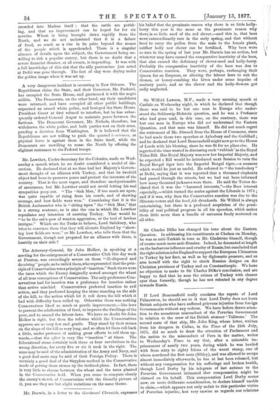The Attorney-General, Sir John Holker, in speaking at a meeting
for the enlargement of a Conservative Club this day week at Preston, was exceedingly severe on those " ill-disposed and deceiving" people, as he called them,who represented that the prin- ciple of Conservatism was a principle of " inaction." Such views were the tares which the Enemy designedly sowed amongst the wheat of all true conceptions of Conservatism. The only preference Con- servatives had for inaction was a preference for inaction rather than active mischief. Conservatives preferred inaction to evil action, and they preferred keeping the stone standing on the aide of the hill, to the action which let it roll down the hill which it had with difficulty been rolled up. Otherwise there was nothing Conservatives liked so much as gentle improvement,—like laws to prevent the adulteration of food, to improve the dwellings of the poor, and to amend the labour-laws. We have no doubt Sir John Holker is right, but then the reforms which the Conservatives approve are so very few and gentle. They stand by their stones on the slope of the hill so very long, and so often let them roll back a little, under pretence of making great efforts to roll them up- wards,—that the effect is very like "inaction " at times. The Educational stone certainly took three or four revolutions in the wrong direction, for every five or six it took in the right. The same may be said of the administration of the Army and Navy, and a good deal more may be said of their Foreign Policy. There is certainly a good deal of the Sisyphus method in the Conservative mode of getting these stones up the inclined plane. In fact, there is very little to choose between the wheat and the tares planted in the Conservative field. When you come to compare closely the enemy's sketch of Conservatism with the friendly picture of it, you see they are but slight variations on the same theme.






































 Previous page
Previous page